Mercedes EQB vs Nissan Leaf – Which model is better for everyday use?
Compare performance, boot capacity, efficiency and price at a glance.
Find out which car is the better choice for you – Mercedes EQB or Nissan Leaf?
Here’s where it gets real: The technical differences in detail
Costs and Efficiency: Price and efficiency are often the first things buyers look at. Here it becomes clear which model has the long-term edge – whether at the pump, the plug, or in purchase price.
Nissan Leaf has a significantly advantage in terms of price – it starts at 30800 £, while the Mercedes EQB costs 45900 £. That’s a price difference of around 15098 £.
In terms of energy consumption, the advantage goes to the Mercedes EQB: with 15.20 kWh per 100 km, it’s hardly any more efficient than the Nissan Leaf with 16.70 kWh. That’s a difference of about 1.50 kWh.
As for range, the Mercedes EQB performs clearly better – achieving up to 535 km, about 150 km more than the Nissan Leaf.
Engine and Performance: Power, torque and acceleration say a lot about how a car feels on the road. This is where you see which model delivers more driving dynamics.
When it comes to engine power, the Mercedes EQB has a clearly edge – offering 292 HP compared to 217 HP. That’s roughly 75 HP more horsepower.
In acceleration from 0 to 100 km/h, the Mercedes EQB is slightly quicker – completing the sprint in 6.20 s, while the Nissan Leaf takes 6.90 s. That’s about 0.70 s faster.
In terms of top speed, the Mercedes EQB performs barely noticeable better – reaching 160 km/h, while the Nissan Leaf tops out at 157 km/h. The difference is around 3 km/h.
There’s also a difference in torque: the Mercedes EQB pulls visibly stronger with 520 Nm compared to 340 Nm. That’s about 180 Nm difference.
Space and Everyday Use: Cabin size, boot volume and payload all play a role in everyday practicality. Here, comfort and flexibility make the difference.
Both vehicles offer seating for 5 people.
In curb weight, the Nissan Leaf is noticeably lighter – 1580 kg compared to 2105 kg. The difference is around 525 kg.
In terms of boot space, the Mercedes EQB offers clearly more room – 495 L compared to 394 L. That’s a difference of about 101 L.
In maximum load capacity, the Mercedes EQB performs strongly better – up to 1710 L, which is about 920 L more than the Nissan Leaf.
When it comes to payload, Mercedes EQB hardly any takes the win – 435 kg compared to 415 kg. That’s a difference of about 20 kg.
Our conclusion: The Mercedes EQB proves to be dominates this comparison and thus becomes our DriveDuel Champion!
Overall, Mercedes EQB is the better all-rounder in this comparison.
Mercedes EQB
The Mercedes-Benz EQB is an all-electric compact SUV that seamlessly blends practicality with modern luxury. Its sleek design and spacious interior make it an attractive option for families seeking both style and function. With advanced technology and impressive range capabilities, the EQB is a testament to Mercedes-Benz's commitment to sustainable mobility.
details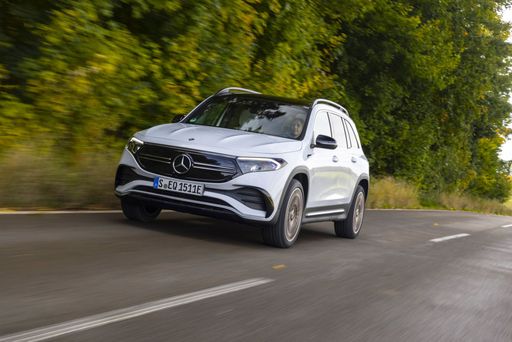 @ group-media.mercedes-benz.com
@ group-media.mercedes-benz.com
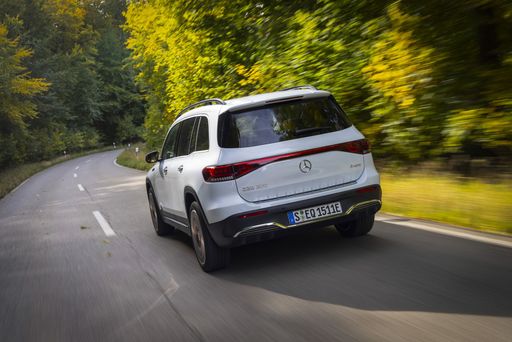 @ group-media.mercedes-benz.com
@ group-media.mercedes-benz.com
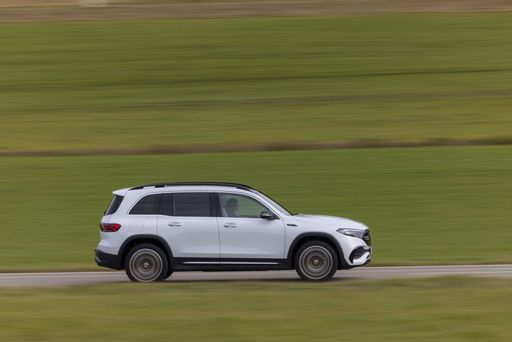 @ group-media.mercedes-benz.com
@ group-media.mercedes-benz.com
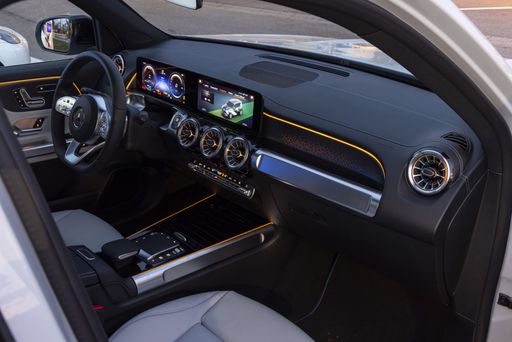 @ group-media.mercedes-benz.com
@ group-media.mercedes-benz.com
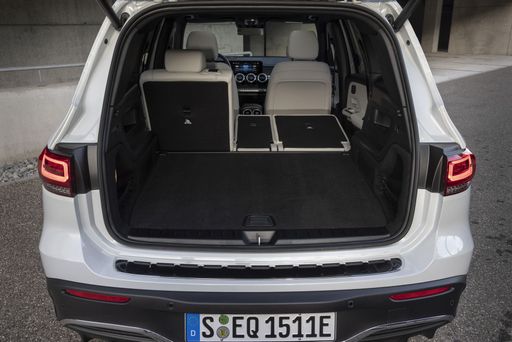 @ group-media.mercedes-benz.com
@ group-media.mercedes-benz.com
Nissan Leaf
The Nissan Leaf stands out as a pioneering model in the realm of electric vehicles, known for its impressive blend of practicality and eco-friendliness. It offers a smooth and quiet driving experience, making it an ideal choice for city commuting and longer journeys alike. The interior design is both comfortable and intuitive, providing drivers with a sense of modernity and ease of use.
details @ germany.nissannews.com
@ germany.nissannews.com
 @ germany.nissannews.com
@ germany.nissannews.com
 @ germany.nissannews.com
@ germany.nissannews.com
 @ germany.nissannews.com
@ germany.nissannews.com

|

|
|
|
|
Costs and Consumption |
|
|---|---|
|
Price
45900 - 58900 £
|
Price
30800 - 37200 £
|
|
Consumption L/100km
-
|
Consumption L/100km
-
|
|
Consumption kWh/100km
15.2 - 17.2 kWh
|
Consumption kWh/100km
16.7 - 17.8 kWh
|
|
Electric Range
468 - 535 km
|
Electric Range
270 - 385 km
|
|
Battery Capacity
70.50 kWh
|
Battery Capacity
39 - 59 kWh
|
|
co2
0 g/km
|
co2
0 g/km
|
|
Fuel tank capacity
-
|
Fuel tank capacity
-
|
Dimensions and Body |
|
|---|---|
|
Body Type
SUV
|
Body Type
Hatchback
|
|
Seats
5
|
Seats
5
|
|
Doors
5
|
Doors
5
|
|
Curb weight
2105 - 2170 kg
|
Curb weight
1580 - 1756 kg
|
|
Trunk capacity
495 L
|
Trunk capacity
385 - 394 L
|
|
Length
4684 mm
|
Length
4490 mm
|
|
Width
1834 mm
|
Width
1788 mm
|
|
Height
1654 - 1689 mm
|
Height
1540 - 1545 mm
|
|
Max trunk capacity
1710 L
|
Max trunk capacity
790 L
|
|
Payload
435 kg
|
Payload
384 - 415 kg
|
Engine and Performance |
|
|---|---|
|
Engine Type
Electric
|
Engine Type
Electric
|
|
Transmission
Automatic
|
Transmission
Automatic
|
|
Transmission Detail
Reduction Gearbox
|
Transmission Detail
Reduction Gearbox
|
|
Drive Type
Front-Wheel Drive, All-Wheel Drive
|
Drive Type
Front-Wheel Drive
|
|
Power HP
190 - 292 HP
|
Power HP
150 - 217 HP
|
|
Acceleration 0-100km/h
6.2 - 8.9 s
|
Acceleration 0-100km/h
6.9 - 7.9 s
|
|
Max Speed
160 km/h
|
Max Speed
144 - 157 km/h
|
|
Torque
385 - 520 Nm
|
Torque
320 - 340 Nm
|
|
Number of Cylinders
-
|
Number of Cylinders
-
|
|
Power kW
140 - 215 kW
|
Power kW
110 - 160 kW
|
|
Engine capacity
-
|
Engine capacity
-
|
General |
|
|---|---|
|
Model Year
2024 - 2025
|
Model Year
2019
|
|
CO2 Efficiency Class
A
|
CO2 Efficiency Class
A
|
|
Brand
Mercedes-Benz
|
Brand
Nissan
|
What drive types are available for the Mercedes EQB?
The Mercedes EQB is available as Front-Wheel Drive or All-Wheel Drive.
The prices and data displayed are estimates based on German list prices and may vary by country. This information is not legally binding.
